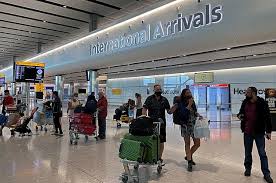By Ben Kerrigan-
Overseas holidays and visits to up to 90 countries will be made possible as from from Monday without the need to quarantine for 14 days on return, the British government has confirmed.
The Foreign Office is to lift its ban on non-essential travel to nearly all EU countries, British territories such as Bermuda and Gibraltar, and Australia and New Zealand. The list is also expected to include Turkey but not countries on the government’s “red” list, such as the US, Russia and Brazil,
The announcement, confirmed by government officials and due on Friday, ends the air-bridge or travel corridor policy that has been pursued by the transport secretary, Grant Shapps, for several weeks.
The relaxation comes in the wake of three legal suits from British Airways, Raynair and Easy Jet. All three airlines sort judicial review o the grounds that the policy was unreasonable and would irreversibly damage their respective industries.
In law, any policy found by the court to be irrational or unreasonable can be declared illegal and abolished have the power to review governmental policies under a process called judicial review. Two well established grounds for judicial review in the UK are rationality and reasonableness. Any policy found by the court to be irrational or unreasonable can be declared illegal and abolished.
The quarantine policy was designed to keep overall levels of infection down , but the argument could run into trouble when it is considered that many of the countries to be forced to quarantine for 14 days had lower infection and death rates than the Uk.
The government’s chief scientific adviser, Sir Patrick Vallance, had rejected support of the blanket quarantine policy, saying that the advice from SAGE was that quarantines are most effective when they’re applied to people from countries with higher rates of infection. In the UK’s case, this would only be a handful of countries, such as Brazil and the USA.
The quarantine policy had immense public support, but not well considered and evaluated by any stretch of the imagination. The damage to international tourism and individual liberty that would result from implementing such a blanket policy would have been far reaching.
The British government took the wise step in reviewing its decision and changing direction on the quarantine policy.
All passengers have been required to go into self-isolation for 14 days at a declared address since the end of the first week of June, with fines of up to £1,000 in England for those who breached it
The Scottish first minister, Nicola Sturgeon, complained that Scotland had not been adequately consulted and that the UK’s position had changed three times in the past 24 hours.
Shapps told Scottish National party MPs in Westminster that they needed to lean on Sturgeon to change her mind.
All countries included in the new travel list are expected to be on the government’s green list of low-risk nations for coronavirus, or from the amber list, which is medium risk.
There are still some countries which have suspended flights from the UK, or closed their borders entirely. Infection rates in countries like Australia, Belgium, and Italy are still being studied by experts but still not been given the all clear.
The current relaxation makes more sense and visitors will be expected to self isolate on their own if they experience any symptoms.




